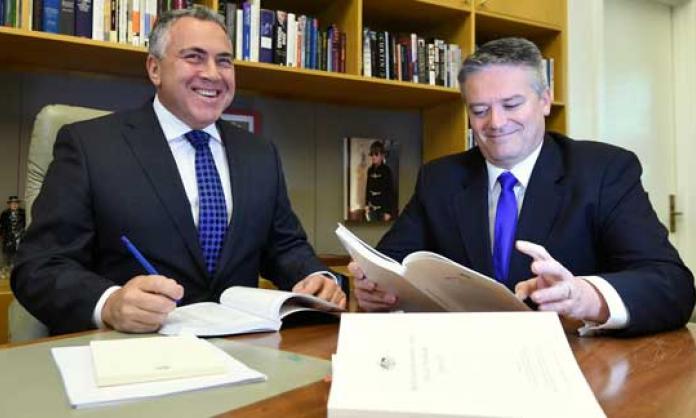The federal government’s mini Budget, known as the Mid-Year Economic and Fiscal Outlook (MYEFO), means more pain for the poor. There are to be more cuts to benefits, jobs and government services, while hundreds of millions of dollars is spent on the military and security forces.
The May budget’s predictions for the economy have been shot to blazes by a collapse in commodity prices and slowing economic growth. Government income has fallen well short of predictions.
The biggest cut is to foreign aid. On top of the $7 billion already cut over three years in the May budget, treasurer Joe Hockey has now set out another $4 billion in cuts.
The public sector workforce is also getting it in the neck from Joe Hockey and finance minister Matthias Cormann. The Abbott government has already cut at least 8,000 jobs and now plans to chop another 8,700, with a focus in 2015 on the departments of health and education. Half a billion dollars will be saved by axing or consolidating 175 government agencies, including those working with some of the most vulnerable groups in the community.
Meanwhile, unemployment, already at a 12-year high of 6.3 percent, is forecast to rise to 6.5 percent, up from the previous estimates of 6.25 percent. Nearly 800,000 are now unemployed and if economic growth falls back further, the Coalition will be going to the next election with unemployment at close to one million people.
Other big cuts to government spending include reduced payments to public hospitals, in the order of $941 million over four years, and $852m saved by delaying the end date for its planned freeze on family tax benefit payment rates and eligibility thresholds for government payments. The government will gouge an extra $374 million over four years by increasing application fees for partner visas by 50 percent to a whopping $4,628.
In the field of education and training, adult apprentices earning less than the minimum wage will lose access to support payments worth up to $7,800 a year.
Another $104 million will be saved by not extending student income support, such as Youth Allowance, to all university students studying a masters degree by coursework.
Then there are the things that will save the government peanuts but betray its enthusiasm to hurt the most vulnerable. The dementia and severe behaviours supplement, which provides a payment of $16 a day to residential facilities for each eligible dementia patient, will be cut.
The government will also save a pitiful $30 million over four years by no longer paying social security benefits to people who are incarcerated or confined to psychiatric institutions because they are considered unfit to stand trial
The winners
If poor people, the sick, pensioners, workers and students are all getting slugged, the various “security” agencies will be rolling in extra government largesse.
The government is providing an extra $650m over four years for counter-terrorism funding. ASIO, the Australian Secret Intelligence Services and the Australian Federal Police will all share in the spoils. An extra $200 million will be set aside to beef up security at Parliament House and $88m will go towards boosting security in commonwealth parliamentary offices and personal bodyguards for politicians.
There’s plenty of money for military ventures, with $300 million going to fund SAS and RAAF operations in Iraq and Syria over three years, adding to the billions that have been spent on waging war in the Middle East since 2001.
The introduction of “contestability” for public services will shovel hundreds of millions of dollars in business to the Coalition’s wealthy corporate backers as government services are transferred to the private sector.
While university students’ debts are predicted to double to $50 billion by 2018 if fee deregulation measures pass the Senate next year, the government is setting aside another $100 million to help the vice chancellors get their systems in place to slug students with extra fees.
And the school chaplaincy programs have been ring-fenced: no cuts to their $240 million budget for the next four years.
Worse to come?
Hockey and Abbott are sporting bloody noses this year as a result of the opposition to their May budget. Senate obstruction, fuelled by protests, particularly by the university students, has blocked the passage of many of their proposed cuts.
But if they’ve been hurt, there’s no sign they are prepared to give up. Education minister Christopher Pyne has vowed to bring his education “reforms” back to Senate when it sits again in February.
Hockey is preparing a new round of propaganda to sell his package of cuts. The only “mistake” that he accepts responsibility for is that the government did not spend enough time on “marketing”. He told the Financial Review on 12 December that he is determined to put his foot back on the accelerator in the New Year.
We can’t tell whether that comes to pass given widespread business anxiety about the slowing economy, but we do know that the only thing that can hold the government at bay from its harsh and anti-working class measures not just next year but into the future is determined resistance.









